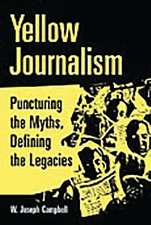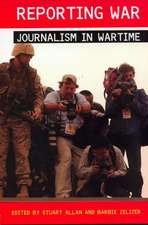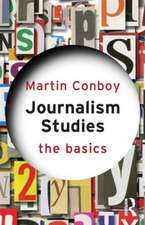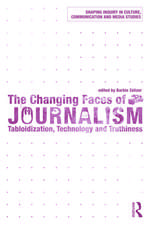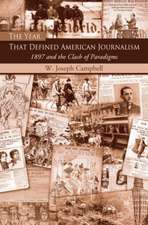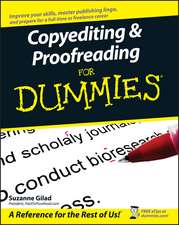Transparency, Public Relations and the Mass Media: Combating the Hidden Influences in News Coverage Worldwide: Routledge Focus on Public Relations
Autor Katerina Tsetsura, Dean Kruckebergen Limba Engleză Hardback – 15 noi 2016
| Toate formatele și edițiile | Preț | Express |
|---|---|---|
| Paperback (1) | 185.40 lei 6-8 săpt. | |
| Taylor & Francis – 30 iun 2020 | 185.40 lei 6-8 săpt. | |
| Hardback (1) | 454.50 lei 6-8 săpt. | |
| Taylor & Francis – 15 noi 2016 | 454.50 lei 6-8 săpt. |
Preț: 454.50 lei
Preț vechi: 534.71 lei
-15% Nou
Puncte Express: 682
Preț estimativ în valută:
86.97€ • 90.80$ • 71.98£
86.97€ • 90.80$ • 71.98£
Carte tipărită la comandă
Livrare economică 05-19 aprilie
Preluare comenzi: 021 569.72.76
Specificații
ISBN-13: 9780415884242
ISBN-10: 0415884241
Pagini: 114
Ilustrații: 4
Dimensiuni: 138 x 216 x 13 mm
Greutate: 0.27 kg
Ediția:New.
Editura: Taylor & Francis
Colecția Routledge
Seria Routledge Focus on Public Relations
Locul publicării:Oxford, United Kingdom
ISBN-10: 0415884241
Pagini: 114
Ilustrații: 4
Dimensiuni: 138 x 216 x 13 mm
Greutate: 0.27 kg
Ediția:New.
Editura: Taylor & Francis
Colecția Routledge
Seria Routledge Focus on Public Relations
Locul publicării:Oxford, United Kingdom
Public țintă
Postgraduate and UndergraduateCuprins
1. An Incomplete Truth
2. Multiple Truths
3. Media Practice or Media Bribery? Conceptual and Theoretical Considerations and Implications
4. Dispelling the Myths of the Ethical Significance and Validity of the Concept of Cultural Relativism and the Need for Cultural Tolerance in Combatting Media Bribery Worldwide
5. The Global Study of Media Transparency
6. Professional Communities against Media Bribery
7. A Normative Theory of Media Bribery
2. Multiple Truths
3. Media Practice or Media Bribery? Conceptual and Theoretical Considerations and Implications
4. Dispelling the Myths of the Ethical Significance and Validity of the Concept of Cultural Relativism and the Need for Cultural Tolerance in Combatting Media Bribery Worldwide
5. The Global Study of Media Transparency
6. Professional Communities against Media Bribery
7. A Normative Theory of Media Bribery
Notă biografică
Dean Kruckeberg, APR, Fellow PRSA, is a professor in the Department of Communication Studies at the University of North Carolina at Charlotte, USA. He is co-author of Public Relations and Community: A Reconstructed Theory and of This Is PR: The Realities of Public Relations. Kruckeberg is author and co-author of many book chapters and articles dealing with global PR and international PR ethics.
Katerina Tsetsura, Ph.D., is a Gaylord Family professor of strategic communication/public relations in the Gaylord College of Journalism and Mass Communication at the University of Oklahoma, USA She has published over 80 peer-reviewed studies and serves as a member of the editorial board of Communication Theory, International Journal of Strategic Communication, PR Journal, and PR Review journals, among others.
Katerina Tsetsura, Ph.D., is a Gaylord Family professor of strategic communication/public relations in the Gaylord College of Journalism and Mass Communication at the University of Oklahoma, USA She has published over 80 peer-reviewed studies and serves as a member of the editorial board of Communication Theory, International Journal of Strategic Communication, PR Journal, and PR Review journals, among others.
Descriere
Transparency, Public Relations and the Mass Media is about media transparency and good-faith attempts of honesty by both the sources and the gate-keepers of news and other information that the mass media present as being unbiased. Specifically, this book provides a theoretical framework for understanding media transparency and its antithesis--media opacity--by analyzing extensive empirical data that the authors have collected from more than sixty countries throughout the world. The practice of purposeful media opacity, which exists to greater or lesser extents worldwide, is a powerful hidden influencer of the ostensibly impartial media gate-keepers whose publicly perceived role is to present news and other information based on these gate-keepers’ perception of this information’s truthfulness. Empirical data that the authors have collected globally illustrate the extent of media opacity practices worldwide and note its pervasiveness in specific regions and countries. The authors examine, from multiple perspectives, the complex question of whether media opacity should be categorically condemned as being universally inappropriate and unethical or whether it should be accepted, or at least tolerated, in some situations and environments.





